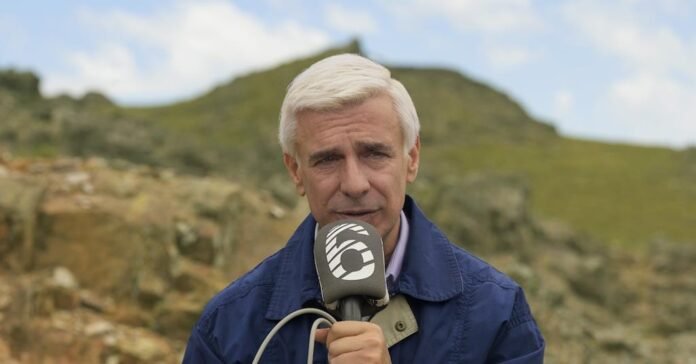Dir. Diego Lerman. Argentina 2024. 107 minutes
The reality is on the market – but it surely’s not strictly dependable in extra-terrestrially fanciful media satire The Man Who Liked UFOs. Competing in San Sebastian, the newest function from Argentinian writer-director Diego Lerman (All of a sudden, The Invisible Eye) follows a infamous real-life episode within the profession of the late José de Zer, a preferred journalist and TV reporter.
Every little thing hinges on Sbaraglia’s efficiency as a likeable if self-serving and faintly sleazy determine
Musing on questions of creativeness, actuality and the standing of fact within the pre-digital media world, this whimsical Netflix dramedy is a definite departure from the more durable realism of Lerman’s earlier movie The Substitute. Whereas Argentinian viewers would possibly beam nostalgically on the references, the broader world is prone to reply with a shrug – apart from Spain and different territories the place lead Leonardo Sbaraglia is a draw.
Argentinian actor Sbaraglia – whose current European collaborations embrace Olivier Assayas’s Wasp Community and Almodóvar’s Ache And Glory – seems with bleached hair as de Zer who, when the story begins in 1986, is an leisure reporter for a Buenos Aires TV channel. He’s first seen making a backstage go to to Monica (Monica Ayos), a middle-aged showgirl and chatshow host who can be his occasional lover. He later collapses whereas filming her – apparently having sighted a mysterious flash within the sky – and experiences a flashback to a imaginative and prescient he acquired within the Sinai Desert whereas engaged within the Six Day Struggle.
On waking in hospital, José is approached by a mining firm government who desires him to report on alleged UFO exercise within the mountain city of La Candelaria, in order to supply a lift for native tourism. Simply persuaded, José units off along with his devoted cameraman Chango (Sergio Prima) – “Comply with me, Chango!” apparently being a catchphrase beloved by all who keep in mind De Zer.
In La Candelaria, there’s scant proof to counsel something unusual, however José – spurred by an ambivalent mixture of visionary enthusiasm and bare urge for food for publicity – manages to spin out his skimpy, trumped-up reportage over a number of weeks, changing into a hero to residents solely too glad to be on the map ultimately. The protection additionally enhances his private profile – he’s even seen sharing a shower of pretend plastic bubbles with Monica on her super-tacky TV present – however he faces scepticism from colleagues at his channel, from his ex-wife and from their teenage daughter Marti (a properly spiky characterisation from the director’s personal daughter Renata Lerman). Finally, starvation for a great story – even when it’s a preposterous one – leads him into hazard and at last, it’s instructed in an altogether crazy climax, some type of transcendental redemption.
Shot in widescreen with expressionistic touches of distortion at fringe of body, the movie has simple sweep in its panorama imagery, capturing the mountainous territory of Argentina’s Córdoba province. It additionally judiciously downplays the visible references to 80s know-how and vogue, so typically exaggerated in interval films. With a surfeit of sketchily-limned supporting characters detracting from the story’s focus, every part hinges on Sbaraglia’s efficiency as a likeable if self-serving and faintly sleazy determine. The actor adeptly balances the weather of naivety and cynicism – on one hand, a semi-visionary bought on his personal myth-making, on the opposite a huckster in love along with his energy to influence.
Dramatically, nonetheless, and by way of the comedian ironies that this story may probably pack, the movie lacks chunk, its building not fairly maximising the twists and turns of José’s inconceivable progress. The ending additionally directs too cutely gratifying a wink to the viewer – and, lest we predict that is all a trumped-up story, makes use of the ever-popular machine of displaying archive footage of De Zer’s precise broadcasts. All through, use of fuzzy TV and video textures will please techno-nostalgists craving for the times earlier than digital smoothness ironed out the crunchier digital grit.
Manufacturing firm: CampoCine
Worldwide distribution: Netflix
Producers: Nicolas Avruj, Diego Lerman
Screenplay: Diego Lerman, Adrian Biniez
Cinematography: Wojciech Staron
Editor: Federico Rotstein
Manufacturing design: Marcelo Chaves
Music: José Villalobos
Principal solid: Leonardo Sbaraglia, Sergio Prima, Osmar Nuñez, Renata Lerman
